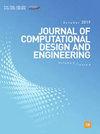基于增强量子粒子群优化神经网络的新型变直径模具弯曲管截面变形预测
IF 6.1
2区 工程技术
Q1 COMPUTER SCIENCE, INTERDISCIPLINARY APPLICATIONS
引用次数: 0
摘要
金属弯管以其轻量化、高强度、高性能的特点,在航空领域得到了越来越广泛的应用。然而,对定制管状零件的需求不断增长,导致传统管弯曲工艺的成本显著增加,因为它们只能加工特定直径的管。为此,本文提出了一种可变直径模具(VDD)方案,该方案可以弯曲具有特定直径范围的管材。为了研究VDD管材的成形性能,需要一种准确、可靠的截面变形预测方法。因此,我们提出了一种基于量子行为粒子群优化(QPSO)优化的反向传播神经网络(BPNN)的智能模型来预测合理的横截面畸变表征指标:平均畸变率(ADR)。在QPSO中引入系数自适应调整和高斯分布随机向量,分别平衡了种群的搜索和增强了种群的多样性。为了进一步提高优化性能,将知情初始化策略应用于QPSO。通过与BPNN、带有Xavier初始化的BPNN、几种不同的PSO变体优化BPNN模型和流行的机器学习模型变体的结果比较,评价了所提出的增强QPSO (RQPSO)优化BPNN模型的效率。结果表明,RQPSO在决定系数(${R}^2$)、方差占比(VAF)、均方根误差(MSE)、平均绝对误差(MAE)和MSE的标准差(SDM)等方面均优于其他方法。因此,该算法可作为一种可靠、准确的预测vdd加工管截面畸变的技术。本文章由计算机程序翻译,如有差异,请以英文原文为准。
Reinforced quantum-behaved particle swarm-optimized neural network for cross-sectional distortion prediction of novel variable-diameter-die-formed metal bent tubes
With lightweight, high strength, and high performance, metal bent tubes have attracted increasing applications in aeronautics. However, the growing demand for customized tubular parts has led to a significant increase in the cost of conventional tube bending processes, as they can only process tubes of a specific diameter. To this end, this paper proposes a variable diameter die (VDD) scheme which can bend tubes with a specific range of diameters. To investigate the formability of VDD-processed tubes for practical VDD applications, an accurate and reliable prediction method of cross-sectional distortion is imperative. Hence, we pioneer a novel intelligent model based on quantum-behaved particle swarm optimization (QPSO) optimized back-propagation neural network (BPNN) to predict a rational cross-sectional distortion characterization index: average distortion rate (ADR). The adaptive adjustment of coefficients and the Gaussian distributed random vector are introduced to QPSO, which balance the search and enhance the diversity of the population, respectively. For further improvement in optimization performance, the informed initialization strategy is applied to QPSO. The efficiency of the proposed reinforced QPSO (RQPSO) optimized BPNN model is evaluated by comparing the results with those of the BPNN, BPNN with Xavier initialization, several different PSO variants optimized BPNN models and variants of popular machine learning models. The results indicated the superiority of RQPSO over other methods in terms of the coefficient of determination (${R}^2$), variance account for (VAF), root mean square error (MSE), mean absolute error (MAE), and standard deviation of MSE (SDM). Thus, the proposed novel algorithm could be employed as a reliable and accurate technique to predict the cross-sectional distortion of VDD-processed tubes.
求助全文
通过发布文献求助,成功后即可免费获取论文全文。
去求助
来源期刊

Journal of Computational Design and Engineering
Computer Science-Human-Computer Interaction
CiteScore
7.70
自引率
20.40%
发文量
125
期刊介绍:
Journal of Computational Design and Engineering is an international journal that aims to provide academia and industry with a venue for rapid publication of research papers reporting innovative computational methods and applications to achieve a major breakthrough, practical improvements, and bold new research directions within a wide range of design and engineering:
• Theory and its progress in computational advancement for design and engineering
• Development of computational framework to support large scale design and engineering
• Interaction issues among human, designed artifacts, and systems
• Knowledge-intensive technologies for intelligent and sustainable systems
• Emerging technology and convergence of technology fields presented with convincing design examples
• Educational issues for academia, practitioners, and future generation
• Proposal on new research directions as well as survey and retrospectives on mature field.
 求助内容:
求助内容: 应助结果提醒方式:
应助结果提醒方式:


